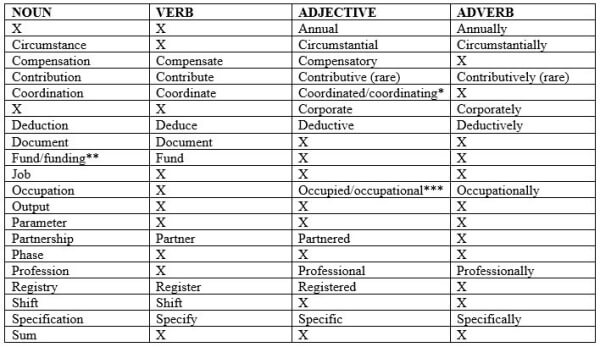In a recent Magoosh Comics post we reviewed the concept of multiple word forms—the way that the same word can serve different grammar purposes.
Sometimes a word can have two different grammar uses and the exact same form. For example, you can change your clothes (change as a verb) or put on a change of clothes (change as a noun). In other cases, the grammatical form of a word changes because a suffix—an extra sound/set of letters—is added to the end of the word. For example, word itself is a noun, but wordy is an adjective used to describe writing or speech that has a lot of words.
In an earlier series of posts on this blog, I looked at the different forms of words from the Magoosh TOEFL Vocabulary PDF. In this new series, we’ll look at some of the words from a larger word list that’s also very important to the TOEFL: the Academic Word List. This is a collection of all the English words most commonly used in higher education. First up, we’ll study the different forms of common academic words in university business classes.
Suffixes that change the forms of the words:
Nouns: -ion, -ing, -ship, -ation
Verbs: -ate, -fy
Adjectives: -al, -ial, -ory, -ive, -ied, -ed, -ic, -ing
Adverbs: -ally, -ly, -ively, -ionally, -ically

Notes for different word forms in the same grammar category:
* ”Coordinated” describes to people or things that coordinate with each other. (Our coordinated work helped us finish the project quickly.) “Coordinating” may have the same meaning as coordinated. (Our coordinating work helped us finish the project.) “Coordinating” may also describe a person or thing that coordinates other people or things. (As we worked together, we followed the orders of the coordinating supervisor.)
** “Fund” and “funding” have the same basic meaning. However, “fund” is treated as a count noun, while “funding” is treated as a non-count noun.
*** “Occupied” describes a person who has a job. (I am occupied as a university teacher.) “Occupational” describes something that is related to a job. (One of my occupational requirements is that I must have a Master’s degree.)
Now, some of these words are quite easy. You likely already know what job means, and you probably also know all the different grammatical functions of common words like document and partner. You may need to look up some of the other words listed above.
Since these words are often used in a business sense in university classes, read the different dictionary definitions of these words carefully. Which definitions are relevant to business? In what way might these words be used in a university business course?
Once you’ve studied and learned these new words, you’ll be ready to take a quiz on them. In my next post in this series, I’ll present a vocabulary listening quiz based on this word list.






Leave a Reply